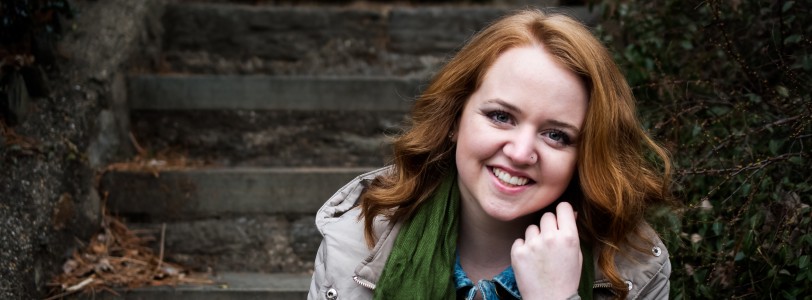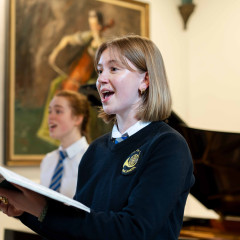Could you first introduce yourself to the reader?
Hi! I’m Cara, and I’m a 21-year-old student from the US. I’ll be a senior musical theatre major at the University of the Arts in the fall. After I graduate, I hope to eventually get my masters in theatre. I’ve been performing since I was 5 years old, and I can’t imagine doing anything else. Besides acting, I also love writing; I’m a writing tutor at my University and enjoy writing short plays. I’m super excited to premiere my first full-length play that I wrote and will be performing in, Puffin Island, at the Fringe this year.
Tell us about your show?
Puffin Island is a true story based on my own experiences that intertwines some of the darkest parts of humanity with adventure and love. It follows the characters Cara and Paul as they meet for the first time in Edinburgh and quickly fall for each other. Their one date turns into days of exploring Scotland, until Cara leaves to travel around other parts of Europe. In a twist of events, Paul rushes back to her as she struggles to navigate surviving a serious crime.
Why do you want to perform at Edinburgh Festival Fringe?
Puffin Island revolves around sexual assault, which is an issue people worldwide deal with. With the Edinburgh Festival Fringe attracting an international audience. I thought it was the perfect place to premiere this piece of theatre. Having Puffin Island debut at the Edinburgh Fringe can enable it to reach the wide range of audiences that it needs to, to hopefully inspire solidarity and healing and educate people on this topic.
Where did the title Puffin Island come from?
I’m a huge nature lover, and when I was traveling throughout Europe last year, I was constantly trying to find places where I could find puffins, but I never found them. To me, puffins are some of the cutest and most beautiful birds.
The puffin has a lot of symbolism for the character Cara in Puffin Island. She tries to see them on multiple occasions but can’t find them. Just because she can’t spot any, doesn’t mean they don’t exist in the world. When dealing with the aftermath of sexual assault, it’s easy to feel hopeless and stuck in a dark place. However, it’s good to remember that there is still beauty to be found, even if you don’t see it in that moment. There’s a quote from a book called All My Friends Are Dead that was a staple to me while writing Puffin Island and inspired thepuffin symbolism: “Sometimes I feel alone. Some days are long and hard. But when I look out into this world, I am struck by the impossible beauty of it all. Those billions of magnificent accidents that led us to where we are today, that led us to paper planes and nautilus shells and the tiny, crooked smiles of children. When I think about the small perfections of the world, I have faith that my time will come. I have faith that someday, a warm light will flood over me and I will find peace.” -Avery Monson
The puffin stands for hope and searching for the light when it seems like the world is pitch black.
Puffin Island is the true story of your sexual assault while travelling. Why did you decide to write a show about it?
The months following my assault were incredibly difficult and lonely for me. You don’t often hear about the healing process of survivors, so I was really lost and felt alone. I started attending a group for survivors of sexual assault, and it was the most relieving feeling to hear other stories and have other people share their process of healing. That group completely changed my life, and I can’t thank them more. I decided to write Puffin Island to share my story with other possible survivors to let them know they’re not alone, and also, to show people how sexual assault can affect someone. Sexual assault is no longer a taboo topic, and now it's encouraged that people talk about, it is becoming known that it’s an issue we have in our culture. Now, I want to share the stories of healing and recovery and the immediate aftermath of an assault to make it a real and personalized issue as opposed to a statistic that people read about.
Was/is it difficult reliving the ordeal when writing and performing the show?
Yes, when I first tried to write the show, I got awful nightmares again after being able to get rid of them. I knew it wasn’t time, yet, so I closed the document and put it aside. My partner, Paul, was fantastic, because we both knew that we wanted to write a play about our experience, but I wasn’t ready mentally yet. So, Paul wrote down a 20-page paper summarizing all of the events leading up to the assault and after the assault, so we could return to the script when I was ready. Around six months later, we got the first drafts of the script started. At that point, I had been in individual therapy as well as in my group for survivors, and I felt empowered by telling my story, and I was ready to write the script.
Do you view Me Too as the vehicle to bring about social change? What more can or should be done?
The Me Too movement inspired people all over to come forward with their stories of assault. Before then, I think it was more of a “forbidden” thing to talk about. There’s a lot of guilt and shame that can come with going through an assault, so Me Too was a great way to show people that they aren’t alone, and it’s not something that was their fault or that they need to feel guilty about—the movement made it obvious that it’s a problem with society.
Something that I would love to see now is better sex education in primary school regarding the importance of giving and receiving consent. I think there are a lot of things culturally that hint towards women-identifying individuals owing people sexual acts or it being impolite to say no that need to change. One of the biggest things that terrified me after my assault is seeing all of the articles in the news about victim-blaming in sexual assault cases. There’s a heavy emphasis on victim-blaming in our culture when someone does come forward and say that they’ve been assaulted, and it’s scary and encourages people to stay quiet. That needs to change.
You have written this show in collaboration with Paul Stirrat, a Scottish actor. Being based in the States, how did you first meet him?
I met Paul when I was traveling throughout Europe last year. I was looking for locals to show me around Edinburgh and Glasgow, and I saw that he was an actor, as well. We went out for dinner and a vault and pretty much stuck together like glue the rest of the week while I was in Scotland.
And what was the writing process like, given that you’re separated by an ocean?
It was interesting—definitely not something that would’ve been possible just a few years ago without modern technology. There were many, many FaceTime calls lasting until 5:00 or 6:00am on his end. Based off of Paul’s long paper of events that I mentioned earlier, I wrote the main outline of the script. I put in red parts that I specifically wanted Paul to write, and we’d FaceTime and work them out and talk about different angles we wanted to tackle certain scenes on. Sometimes we’d both write the same scene and then FaceTime and compare. Lots of sending documents back and forth! It was a nice balance; I’m definitely more of a serious, artsy writer, while Paul is way more comedic and interactive than I am.
How have rehearsals worked?
I’m in Edinburgh most of the summer rehearsing, so we don’t have to rehearse across continents.
What advice would you give to someone who wants to take a show up to the fringe?
If you’re going to take a show to the Fringe, make it something you’re immensely passionate about! It’s truly a ton of work, and it’s taken up all of my thoughts at this point. Based off advice I’ve gotten, it’s easy to get burned out. The passion for what you’re doing keeps you going.
Also, get your social media accounts up early! On our show’s twitter, I’ve learned so much about the Fringe. It’s great to follow journalist that are covering the Fringe and see what they’re writing about and have tweeted during previous Fringe Festivals. Some journalist even tweet PR advice (shoutout to Amy Taylor, @trashtaylor)! Check out other artist’s pages—it’s so fun to follow other shows and tweet to them and see what everyone’s up to!
And what advice do you wish you’d been given when entering the industry?
I’ve been in the industry since a young age, so it’s something I grew up with, but entering university for theatre, I was pretty self-conscious. I wish someone would’ve said that every artist in this industry is unique, and you shouldn’t compare yourself to other people. It really can hinder your performance and happiness. Everyone has their own path in this industry. You never know what casting directors are looking for. Just be yourself!
You’ve been invited to contribute to an upcoming book about sexual harassment. Can you tell us about that?
Yes! The university I go to is in a city, and many students complain about being catcalled or harassed on the street just walking 5 minutes to where our classes were. So, I made a hotline number that you can print out on cards and quickly hand out to street harassers on the street instead of verbally confronting them. They call it or text it thinking they got your number, and it’s a message about the toxicity of catcalling and street harassment. The project hit the national news, and I was able to do a lot of interviews about the number to spread the idea around, which was really cool. The book I’ll be writing in is a handbook for sexual harassment and assault, and I’ve been asked to write a segment about the harmfulness of catcalling in our culture and how the hotline is trying to combat that.
Catcalling and street harassment is another thing I’d like to see changed in regards to the previous question about the Me Too movement. A lot of these incidents are in the form of demands, like “Hey, turn around and smile for me!” and similar commands. When we don’t comply, it’s usually met with vulgar names being thrown at us like being called a “b*tch” or “uptight” or something. This is something that I believe perpetuates rape culture...it pushes the idea that we are obligated to respond to these demands, and if we don’t, we are the ones who are the problem and are called bad names.
This is something I’m working hard to change, so I’m excited about the upcoming book.
When and where can people see your show?
We’ll be at Greenside @ Nicolson Square (Fern Studios) August 3rd-18th (except 12th) at 15:05!
And where can people find, follow and like you online?
To get tickets for Puffin Island, go to https://tickets.edfringe.com/whats-on/puffin-island
Puffin Island’s Twitter is @puffinislplay; instagram is @puffinislandplay, and Facebook is /puffinislandplay.
My personal twitter is @cara_corrigan, and my instagram is @theatre_ginger .
Feel free to check out my website: www.caracorrigan.com









0 Comments